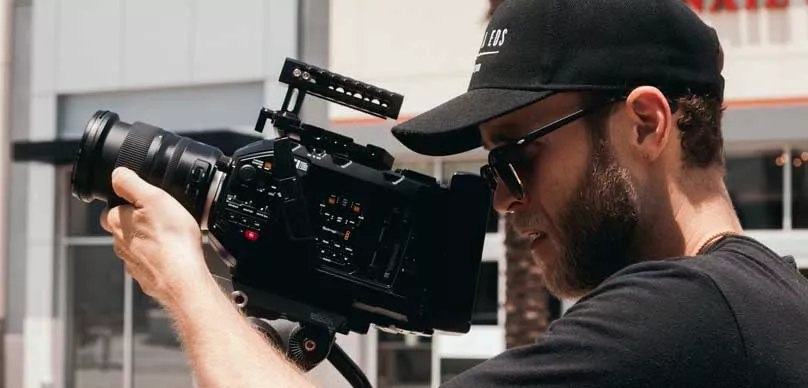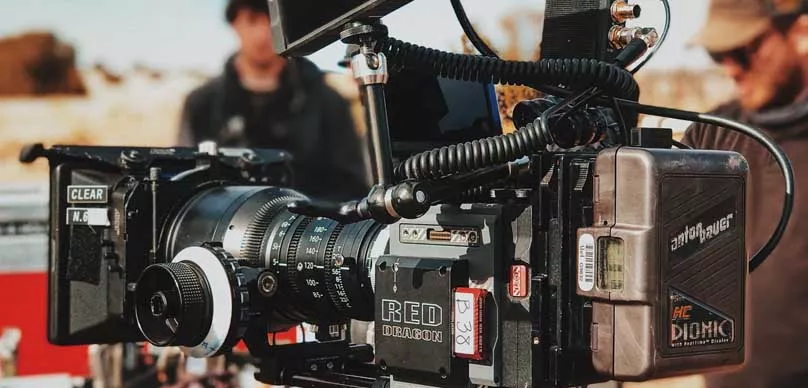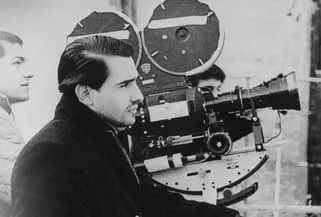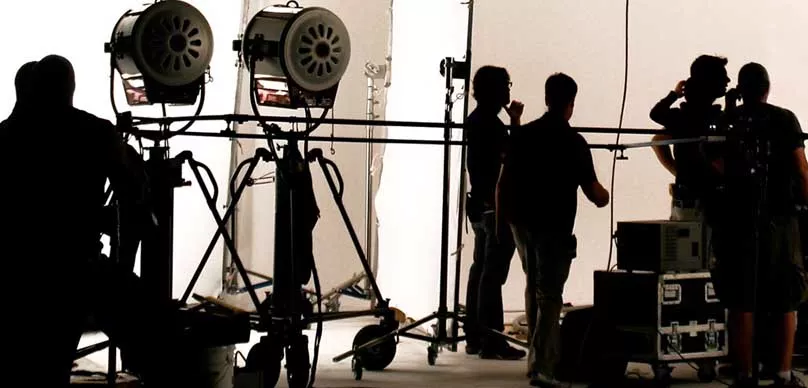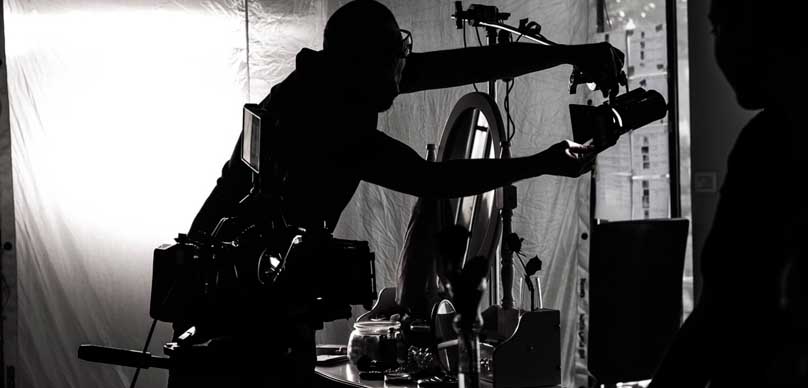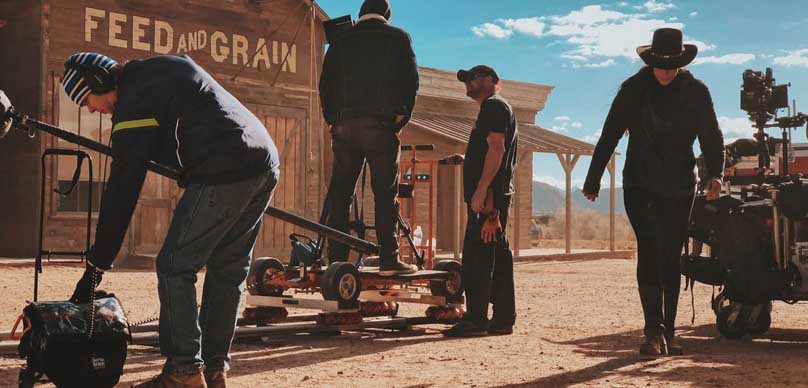A film set is a wacky place full of nicknames, strange film terms, and abbreviations. There have been so many days when someone has asked me to do something and I’ve enthusiastically responded “Copy that”, before realizing I don’t fully know what the film crew even asked. Before long you’ll be using these film terms like a pro and rolling your eyes when the young film-school graduate doesn’t know what a hot brick is.
But for now…here’s 20 film terms to help show off your film savvy next time you’re on set:
- MOW (Make Own Way) – An actor or crew member will transport themselves to set for their call time as opposed to being picked up and driven by the transport department. Don’t muck this one up or you’ll be waiting for the public bus and late to work.
- Crew Call – The time of day shooting is scheduled to begin for the day. Your call time may vary.
- Unit Base – This is where the makeup, costume, and cast trailers are located, as well as crew parking and catering. It’s the largest base and first point of call when arriving for work. (In Los Angeles they call is BASECAMP)
- Recce – Visiting a location before shooting commences there to plan and work through any issues that may arise from the location. Multiple location recces will take place in pre-production with HODs present to ensure no time is wasted during the shoot. Or, often I’ll do important ‘recces’ to the crafties van just to make sure they still have plenty of donuts available.
- Craft Services (Crafties) – An oasis in the desert of boring equipment trucks. The crafties food truck supplies snacks and food to the crew.
- Runner – Runners are the most junior positions on a film. Managed by the office, runners transport stuff between the production office and set, and also pick up anything else needed for the crew. They are not here to pick up your dry cleaning (unless you are the Producer) but they can be great in organizing any pickups and deliveries your department may have. Get friendly with the runners and they’ll be able to help you out in so many ways.
- Pre-Call – When a department or individual has a call time earlier than the crew call. Be sure to check your actual call time rather than the crew call, as it may be different. It’s always embarrassing to receive a call from your boss while you are still in bed.
- New Deal – Moving on to a new camera setup for that scene. The Director and all involved are happy with the takes and “new deal” will be called out by the ADs.
- Flag On the Play – After calling “new deal or moving on” but then someone realizes there was an issue and the take needs to be redone. The crew may call “flag on the play” so people pause and discuss the issue before moving equipment.
- Per Diem – A daily allowance for costs incurred while filming on location. Usually for food and laundry. They used to come in wonderful cash-filled envelopes but now are deposited in your bank account with your paycheck.
- 10/100 or 10/1 – I’m going to the restroom. This often confuses newbies on set as to why someone wouldn’t just say “I’m going to the restroom”, but apparently it’s more polite and film etiquette to use code.
- The Lot – No you aren’t ordering burgers. The lot refers to the film studio. As in “Are you on the lot?”.
- Hot Set – A set that is currently in use for filming or needs to be left as is because filming will return there in the near future. Don’t touch or move the props or set dressing, or else prepare to feel the wrath of the art department.
- Hot Brick – A fully charged walkie-talkie battery. When starting out you need to supply these to your superiors throughout the day.
- DFI (Don’t Follow Instruction) – Stand down, don’t do what I just told you to do, something has changed so it’s not needed anymore, standby for new instructions. Someone may tell you to “DFI” after they have just given you an instruction. Again why not just say “don’t do that”. I think it’s so we film professionals who can pretend we are highly skilled individuals.
- Cowboys – A shot that is framed just above the knees of the subject.
- Blocking – The early stages of rehearsing a scene. The Director works with the cast to place everybody in the set and walk through actions and dialogue. Be sure to give them space and stay quiet while this is happening.
- Abby Singer Shot – The second last camera setup of the day. Named after the renowned Assistant Director, Abby Singer, who always called the last two shots, giving the crew time to start packing up their gear knowing they were almost at wrap. This is the time to make sure the beers are on ice if they aren’t already.
- Martini Shot – The last camera setup of the day. Announced on set so everyone knows to pack up any equipment, not in use.
- Wrap – End something, usually the end of the day of filming but can be used as a wrap on a scene, actor, or item. It’s always nice to hear these words called out at the end of a day, or even better at the end of a job.
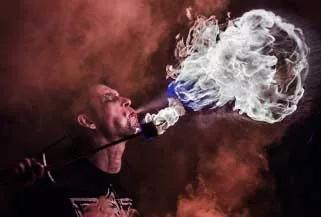
Need Sound Effects for your short or feature film project?
Download 2000+ sound effects designed for indie filmmakers & their projects for free.
Here are a few bonus film terms by LA Film Pro Andy Somers:
Turning Around: a more major change of camera setup, where they begin shooting in the opposite direction. This takes substantially longer than a minor camera setup change when shooting in the same direction because everything that’s currently behind the camera has to be moved out of the way of the new shot. The important implication is that you have a lot more downtime to take a break if not needed during this change.
MOS: meaning “Mit Out Sound”, I.e. They are not recording usable sound for the take.
NDB: Non-Deductible Break, I.e. The free breakfast given to align everyone’s meal penalty periods.
Meal Penalty: free money Union members are given because they didn’t feed you on time.
Picture’s Up: they are about to roll and shoot an actual take.
Rolling: the cameras (and/or sound) are rolling to film a take. Pay attention and be quiet. On stage, this is signified by a single bell or buzzer. A double bell or buzzer means no longer rolling.
Walkie Talkie Lingo Cheatsheet Everyone on Set Should Know
On every project, you will be given a walkie talkie lingo and will be expected to know how to use it to communicate professionally with your department. Initially, this can be daunting if you don’t know how to use it correctly, but radio can save time and is an effective way for people to communicate across the expanse of a film set. Nobody likes wearing a walkie. It’s difficult to listen to one person talk to you, while you hear other people talking over the radio stuck in your ear. With these simple tips, you’ll be running the channels like a pro.
Each department generally has its own channel except for the ADs, Art, Costume, Makeup, and Medics, who often all use channel 1 together. If using channel 1, it is important to restrict the only necessary conversation to that channel. Anything that is specific to one person or lengthy in explanation is best served by channel 2 or another designated chat channel. This keeps the channel free for any immediate contact.
Walkie talkie lingo isn’t just for talking but also for listening to instructions and keeping up with what is happening on set. Depending on your department, most of the information to go about your work will be said over the radio via a superior or another department. Train yourself to listen when you hear these voices so you don’t find yourself asking dumb questions that have already been answered seconds earlier.
Here’s a bunch of tips on understanding walkie talkie lingo like a boss:
- Speaking – push the button and wait half a second before talking. This ensures that the beginning of what you are saying is not lost.
- State your name plus state their name, et voila! Simple, transparent communication is achieved. E.g. ‘Matt to Sam’.
- Wait for their response… E.g. ‘go-ahead’ or ‘hello’. You now have their attention and can ask what you need. If you don’t initially get their attention they could be speaking to someone face to face and won’t catch anything you say.
- If your conversation is going to take longer than a couple of sentences, then best get them to switch to channel 2 or the chat channel. You can now speak freely on channel 2 but don’t forget to switch back to channel 1 when you’re finished or you will miss all the important info rolling around.
- Note – channel 2 isn’t a private channel. Many people will eavesdrop on these conversations if they think it involves them or they are just bored with the regular channel 1 talk. Don’t go stating all your innermost secrets.
- Be clear and precise. Don’t mumble. Don’t use superfluous language, and get to the point already. This involves thinking about what you need to say before engaging in a conversation over the radio. You may find yourself saying some funny things when everyone is listening if you don’t think before you speak.
- Eventually, your battery will die. Charged batteries or ‘hot bricks’ can be found in containers scattered around set or if you’re desperate and in a hurry, the PAs usually carry spares on them.
- Take care of your radio. Charge it each night in the truck and try not to get it wet when it’s raining. There’s nothing worse than a faulty radio that is preventing you from communicating and listening to your department when the set is moving at a million miles an hour.
When starting out, it’s extremely important that you understand how to use the radio effectively. If you are unable to master a simple task like this, your department will banish you immediately and deem you a useless cause. It’s harsh but true. Alternatively, if you nail this within your first week and can be relied on to listen and communicate effectively, you will become an invaluable part of their team.
6 Tips To Cope With An Exhausting Film Schedule
Working in the film industry is demanding and unrelenting, commanding a high level of work ethic over extremely long hours. The lengthy hours and grueling film schedule can test people’s patience, strain relationships, and push people to breaking-point when they are stressed and pressure is applied from higher levels to achieve even more.
It’s important to be aware of this and protect your non-negotiables throughout a job in order to manage family life and certain significant events. You will find your outside social life will decrease dramatically for a season, as you won’t have the time for mid-week dinners and you’ll be sleeping the week off come Saturday.
However, you will make great new friends that form your film family, and these folks will carry you through the fatigue and deliria. You will have amazing experiences, visit awesome places, and do some really cool things. This all makes for great stories when you do have time to go to all the birthday parties and social events when your project concludes.
Here are some simple strategies to cope with the arduous shooting film schedule and grueling industry that have helped me navigate marriage, friendships, and family dynamics.
1. Get as much sleep as possible.
Fatigue leads to grumpiness and exhaustion, which leads to jaded, worn-out film crews; a common feature amongst the overworked, experienced crew. I may not be able to stay up late binge-watching Netflix and won’t be able to discuss the nuances of so-and-so’s social media activity the following day but at least I’ll be looking after my body and mind for the long term. Sleep is incredibly important in refreshing your body after each day and the majority of people don’t get enough each night.
I may not be able to stay up late binge-watching Netflix and won’t be able to discuss the nuances of so-and-so’s social media activity the following day but at least I’ll be looking after my body and mind for the long term. Sleep is incredibly important in refreshing your body after each day and the majority of people don’t get enough each night.
2. Eat well and drink plenty of water.
The catering will be excellent, so it will be easy to do this – but it’s still important. With enough sleep, good food, and plenty of water, your body should be able to function with the demands of long hours. On-set catering makes it easy to eat a variety of vegetables and nutritional food that will keep your body running.
Spending extended hours outside in all sorts of conditions will dehydrate your body unless you endeavor to guzzle plenty of water. Recently on a job, it was so unbearably hot and humid that I was drinking 1 liter of water each hour for an entire day! If someone offers you a drink of water, just take it, even if you aren’t thirsty.
3. Enjoy the break at the end of each job between contracts.
Often you will have a short break between finishing one project and starting the next. It’s hard to line up contracts perfectly as you will either have to leave the previous job early or the next one may not start for a few weeks. Many people stress that they are out of work for a few weeks, but considering they have worked fifty to seventy hour weeks for the last few months, hopefully, there’s a bit of cash with which to relax and enjoy the break. If you’re not in that position, try and get a few TVCs to supplement your income while you recover.
Usually, three days after I finish a job, I’m a bit of a zombie. I sleep in, read, relax, and let my body recover. You’ll really feel it if you do back-to-back jobs without a break. Sometimes this is necessary as you don’t want to turn down the next project but be aware of the back end of that project that you will be prone to getting sick and exhaustion will start to affect your mood and productivity.
Many people stress that they are out of work for a few weeks, but considering they have worked fifty to seventy hour weeks for the last few months, hopefully, there’s a bit of cash with which to relax and enjoy the break. If you’re not in that position, try and get a few TVCs to supplement your income while you recover.
4. Treat your partner or spouse to something special at the end of each job.
You won’t have spent as much time with them over the last few months as you should have so buy them a meaningful gift, go on a holiday, hang out together – whatever it is that enriches the relationship. It’s important to show that your relationship is valuable even though it may have been down the priority list with work taking so much time recently.
There are too many people in the film industry who are divorced or in unhappy situations as a result of working too much, too often, or neglecting to value their spouses when they do have the time.
5. Take your +1 along to your premieres, wrap parties, and any other fun social event the film crew has.
Having the chance to meet your work friends and feel a sense of involvement in each project you do is important. When it comes to discussing the next project, they will know who you are working with again and will be supportive of your career and the opportunities it affords you as a team or family.
6. Book a vacation each year.
Granted, you may not know what or where you will be working but people need holidays. Don’t get caught in the trap of never booking a holiday because you might miss out on the next contract. There’ll always be another job that comes around. Film productions shut down over Christmas and early January so this can be a good time to have a two-week break without risking missing work.
It’s actually surprising how booking a holiday on random dates will often work in with the jobs you are offered anyway. My wife and I usually book a holiday at the end of a big contract – just the two of us having fun together. It doesn’t have to be a really expensive, extravagant getaway, and simple is often the way to go.
After a year or two, you will become accustomed to the lengthy hours, but it will still take a week or two every time you start a job to get used to the long days again, particularly if you’ve had a bit of a break. At the end of a job, you will find yourself exhausted and a break is often well deserved.
If you do happen to do back-to-back jobs, you will definitely start to feel it toward the end of the second or third job as the exhaustion builds. By applying some of these tips, you will hopefully be more prepared to manage the exhaustive long hours and demands that a career in the film industry requires.
10 Tips To Negotiate Your Rate Like A Pro
Learning how to negotiate is a learned skill for most. It is nerve-wracking and awkward, but necessary in the industry. For every job, you will have some kind of negotiation over pay rate and conditions. Negotiation for a job takes place with the Unit Production Manager (UPM) or a Head Of Department (HOD) and definitely gets easier in time.
Asking for more money or dealing with a UPM you don’t know can add to the stress, but you will eventually learn to navigate these conversations with finesse. Initially, you won’t have a lot of bargaining power, so a tip is to more or less take what is on offer. However, time and experience will sharpen your resolve to bargain for what you’re worth, not what you’re offered.
Nevertheless, be mindful that being employed for less than you had hoped for is usually better than no employment at all.
Here are some simple tips to help you negotiate rate:
- Know what your position gets paid. If you go in knowing what you should be offered for that position, you will know how to react when they state an amount. This can be hard when you first start out because it’s not really kosher to ask people what they earn for their position. Many of the unions publish market rates so I’d suggest doing some research on their websites to see what each position is expected to be offered.
- If it’s your first time in this role you are more than likely going to be offered a low rate. We’ve all been there. So long as it’s a good opportunity and you are working with a great crew, don’t worry – it’ll get better as you gain more experience.
- Make sure you are in the right frame of mind to negotiate. I often get called while I am on set but discussing my next contract while juggling three hundred extras is not the right time. I ask them if I can call back at a later time when I can be in a calm environment.
- Politely comment if the rate is below what you were expecting and make it clear what your expectation was. You can always suggest what the union’s market rate is, so you were expecting something closer to that ballpark. You may need to inflate your rate marginally in case you have to negotiate down slightly from what you have stated. If you are on par with the industry rates they will generally come to the party (if the budget allows).
- Remember that the UPM has to negotiate with most of the crew and occasionally the cast, which can number in the hundreds. For them, the shorter the better. Keep your discussions short and state your requests clearly. Don’t play games and hopefully, they won’t either.
- Don’t worry if they start telling you there’s not enough in the budget, everybody’s taken a pay cut, etc. It’s the same story on every job. Know your worth but don’t be greedy. You will discover your rate will differ slightly depending on the scale of the project. This is normal and allows small and independent projects to be made.
- Getting the job is probably more important than arguing over $50 a week. If the UPM or HOD is someone who may give you more work in the future, it may be better to take a small pay cut to ensure work in the future.
- You don’t have to agree immediately. Once the discussion has settled, I often say I’ll have a think and let them know my decision the following day. This allows me to discuss the job with my wife and decide on the pros and cons of doing the project.
- You won’t get every single detail in that initial phone call or meeting. Realistically, you’ll probably only discuss a weekly deal based on a 50-hour week (this comprises of forty normal hours and ten hours at time-and-a-half pay), rough start date and the length of the job. This is also the time to discuss any box rentals such as laptops or tool kits, and vehicle rentals.
- Ask for a summary email. Once the negotiations have been finalized, you can ask for a brief email confirming the rate, box rentals, and dates so you have it in writing if the negotiations took place over the phone.
After you’ve negotiated a rate and details, you will be issued a deal memo. This normally happens during the first week of work, or occasionally you may receive it before you start.
Your deal memo will generally be based on a standard industry contract (otherwise, you should have discussed it in your initial negotiation with the conditions of work stated). The deal memo is the basis for a film crew contract that is undertaken between yourself and the production company for the period of the project or timeline discussed.
I’ve had straightforward negotiations, hard negotiations, and negotiations that have broken down and resulted in me not doing the job. From each experience, I have learned something and have improved at this process each time. These days when I’m negotiating, I can go in confidently knowing what I’m worth and can back it up with previous job rates.
Some people are better at negotiating than others, but you will not be able to avoid this part of the work-life so you might as well get used to it and become good at it.
Matt Webb is the author of Setlife: A Guide To Getting A Job in Film (And Keeping It). He is an Assistant Director with credits including The Great Gatsby, Mad Max: Fury Road, Hacksaw Ridge, Pirates of the Carribean and Alien: Covenant.
Setlife: A Guide To Getting A… is a must-have guide designed to prepare you for what happens on a typical day on a film set. Matt Webb’s no-fuss, practical tips are essential reading for anyone chasing a career in the film industry. He definitely knows on set Film Terms. The book is available for $25 from Amazon.

